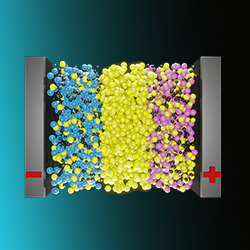New technologies and new applications of advanced batteries
 Advanced batteries play a key role in promoting the development of emerging fields, including but not limited to 3C products, robots, e-tools, EVs, E-ships, E-airplanes and energy storage. Although the lithium-ion battery (LIB) has been one of the most important/revolutionary technologies as recognised by the 2019 Chemistry Nobel Prize, the ever-increasing demands for higher/better energy density, safety, cycle stability and rate performance are calling for new advanced materials/technologies for the next-generation batteries. Many new materials/batteries/systems have been invented based on in-depth fundamental understandings and effective innovations. Among them, hybrid solid/liquid-electrolyte batteries, all solid-state batteries, Li-S and Li-FeSx batteries, and Na-ion batteries are promising candidates to replace the currently predominant LIBs with aqueous organic electrolytes. Therefore, to meet the needs of future development, we propose this special topic collection to bring together the latest original research work at the research frontier of the most promising new materials/technologies/applications of batteries, which could disrupt current directions and satisfy more challenging applications. This collection aims to make a substantial contribution to the development of next-generation advanced batteries in solving critical issues.
Advanced batteries play a key role in promoting the development of emerging fields, including but not limited to 3C products, robots, e-tools, EVs, E-ships, E-airplanes and energy storage. Although the lithium-ion battery (LIB) has been one of the most important/revolutionary technologies as recognised by the 2019 Chemistry Nobel Prize, the ever-increasing demands for higher/better energy density, safety, cycle stability and rate performance are calling for new advanced materials/technologies for the next-generation batteries. Many new materials/batteries/systems have been invented based on in-depth fundamental understandings and effective innovations. Among them, hybrid solid/liquid-electrolyte batteries, all solid-state batteries, Li-S and Li-FeSx batteries, and Na-ion batteries are promising candidates to replace the currently predominant LIBs with aqueous organic electrolytes. Therefore, to meet the needs of future development, we propose this special topic collection to bring together the latest original research work at the research frontier of the most promising new materials/technologies/applications of batteries, which could disrupt current directions and satisfy more challenging applications. This collection aims to make a substantial contribution to the development of next-generation advanced batteries in solving critical issues.
Topics covered include, but are not limited to:
- Stable/new types of solid electrolytes or hybrid solid/liquid electrolytes
- Insight into use of nano-Si/C anodes and Li-rich, sulfur or metal sulfide cathodes
- New developments/analysis of SWNT and graphene additives
- Dry-electrode/membrane design and performance
- Thermal runaway and diffusion
- Smart sensors for batteries
- Na-ion batteries
- Advanced cell designs/configurations
- Advanced characterization techniques/methodologies
Guest Editors
Hong Li, Institute of Physics Chinese Academy of Sciences
Byoungwoo Kang, Pohang University of Science and Technology
Lu Li, National University of Singapore
Xueliang Sun, Western University
Fan Wu, Institute of Physics Chinese Academy of Sciences
